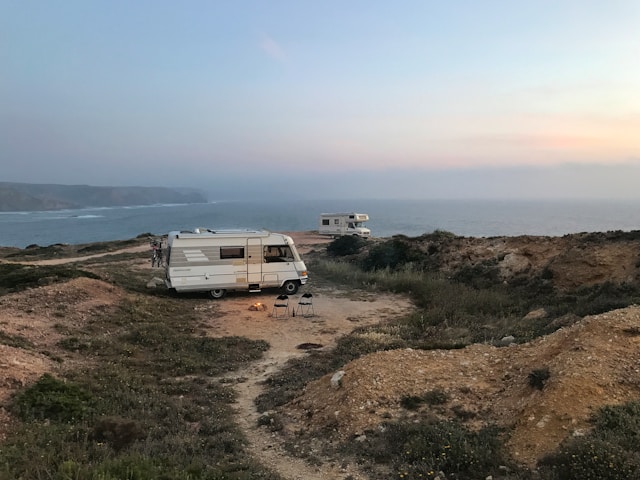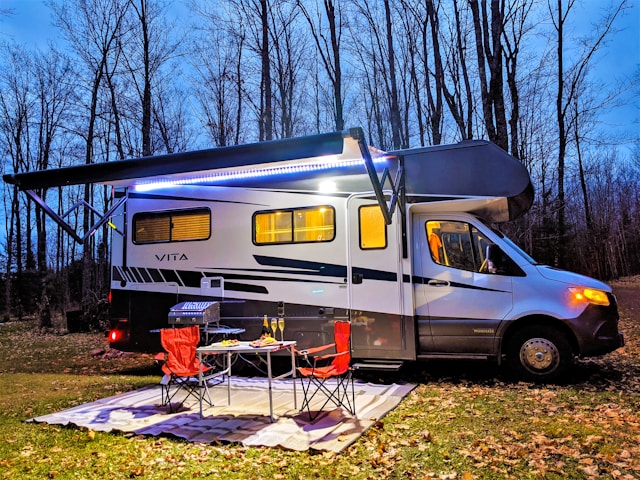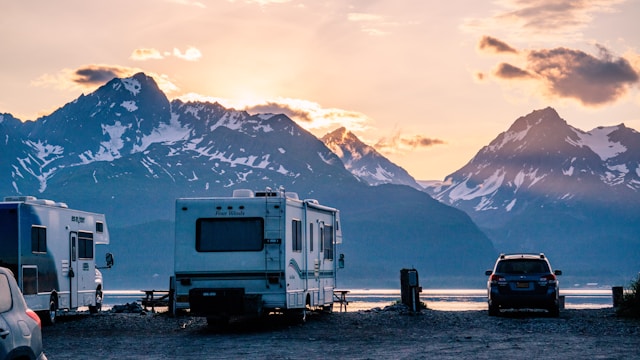
The Ultimate Guide to Boondocking: Tips for Off-Grid RV Camping
cannon
- 0
Boondocking is a popular way to experience the great outdoors while enjoying the comforts of an RV. It involves camping in remote areas without the typical amenities found in campgrounds such as water, electricity, and sewer hookups. Boondocking is also known as dry camping, dispersed camping, and off-grid camping.
Boondocking requires proper planning and preparation to ensure a safe and enjoyable experience. This ultimate guide to boondocking provides tips and tricks for off-grid RV camping, including finding boondocking spots, managing power needs, conserving water, and navigating boondocking with pets. Whether you’re a seasoned boondocker or a newbie, this guide has everything you need to know to master off-grid RV living.
Understanding Boondocking
What Is Boondocking?
Boondocking is a term used to describe camping in an RV or other recreational vehicle in a remote, off-grid location without access to traditional amenities such as water, electricity, or waste facilities. This type of camping is also referred to as dry camping, primitive camping, or dispersed camping. Boondocking offers a unique opportunity to experience nature and the great outdoors without the distractions of modern life.
The Legalities of Boondocking
Boondocking is legal in many areas of the United States, but it is important to research the rules and regulations of the specific location before setting up camp. Some public lands, such as national forests and Bureau of Land Management (BLM) areas, allow boondocking for a limited time period. Other areas may require permits or have restrictions on where and how long you can camp. It is important to respect the environment and leave no trace when boondocking to ensure the sustainability of these areas for future generations.
Benefits of Off-Grid RV Camping
Boondocking offers a unique opportunity to disconnect from the hustle and bustle of daily life and connect with nature. It allows travelers to explore remote areas and experience the beauty of the outdoors without the distractions of modern life. Boondocking can also be a more affordable alternative to traditional RV camping, as many public lands offer free or low-cost camping options. Additionally, boondocking allows for more flexibility in travel plans, as campers are not tied to traditional campgrounds or RV parks. However, it is important to be prepared with adequate supplies and equipment, as boondocking does require more self-sufficiency than traditional camping options.
Preparing Your RV for Boondocking
Boondocking, or camping off the grid, is a great way to experience the great outdoors in an RV. However, before setting out on a boondocking adventure, it is important to prepare your RV for the trip. This section will cover some important considerations for getting your RV ready for boondocking.
Choosing the Right RV
When it comes to boondocking, choosing the right RV is crucial. You want an RV that is rugged enough to handle off-road conditions and has the necessary amenities to keep you comfortable and self-sufficient. Some popular choices for boondocking include truck campers, Class B and C motorhomes, and travel trailers.
Solar Power and Generators
One of the biggest challenges of boondocking is generating power. Without access to shore power, you will need to rely on solar power or generators to keep your RV’s batteries charged. Solar power is a great option for boondocking, as it is quiet, clean, and renewable. However, it can be expensive to install and may not be sufficient for larger RVs. Generators are another popular option, as they can provide a lot of power quickly. However, they can be noisy and require fuel to operate.
Water Conservation and Storage
Water is another important consideration when boondocking. Without access to a water hookup, you will need to conserve and store water carefully. This means taking shorter showers, using paper plates and cups to minimize dishwashing, and using a composting toilet or other waste management system to reduce water usage.
Waste Management Solutions
Speaking of waste management, it is important to have a plan for dealing with your RV’s waste when boondocking. Many boondockers use composting toilets, which use little to no water and produce compost that can be used for gardening. Other options include portable waste tanks or burying human waste in a “cat hole” at least 200 feet from water sources.
By taking the time to prepare your RV for boondocking, you can enjoy a safe and comfortable off-grid camping experience.
Essential Boondocking Gear
Boondocking, or off-grid camping, requires a different set of gear than traditional RV camping. To ensure a successful and comfortable boondocking experience, it is important to have the right equipment. Here are some essential boondocking gear that every boondocker should have:
Energy-Efficient Appliances
Boondocking requires self-sufficiency, especially when it comes to power. Therefore, it is essential to have energy-efficient appliances that can run on battery power. Some of the recommended appliances include LED lights, propane-powered refrigerators, and solar panels.
Navigation and Communication Tools
When boondocking in remote areas, it is important to have reliable navigation and communication tools. A GPS device or a smartphone with a GPS app can be used to navigate to the boondocking location and to explore the surrounding areas. A two-way radio or a satellite phone can be used to communicate with other members of the group or to call for help in case of an emergency.
Safety and Emergency Equipment
Boondocking in remote areas can be risky, so it is important to have safety and emergency equipment on hand. A first aid kit, a fire extinguisher, and a carbon monoxide detector are some of the essential safety equipment. In case of an emergency, a satellite phone or a personal locator beacon (PLB) can be used to call for help.
Overall, having the right gear is crucial for a successful boondocking experience. By packing the right equipment, boondockers can enjoy the freedom and beauty of the great outdoors while staying safe and comfortable.
Selecting the Perfect Boondocking Site
When it comes to boondocking, selecting the right site is crucial for a safe and enjoyable experience. Here are some key factors to consider when selecting the perfect boondocking site:
Research and Planning
Before heading out to a boondocking site, it’s important to do some research and planning. This includes checking for any restrictions or regulations in the area, as well as researching the terrain and weather conditions. A great resource for finding boondocking sites is RV Trip Wizard, which provides detailed information on campgrounds, RV parks, and boondocking sites across the United States.
Assessing Accessibility
When selecting a boondocking site, it’s important to consider accessibility. This includes the condition of the road leading to the site, as well as the size of the site itself. It’s also important to consider the size of your RV and whether it will fit comfortably in the site. Be sure to check for any low-hanging branches or other obstacles that may make it difficult to access the site.
Environmental Considerations
Another important factor to consider when selecting a boondocking site is the environment. This includes the availability of resources such as water, firewood, and waste disposal. It’s also important to consider the impact that your presence may have on the environment. Be sure to follow Leave No Trace principles and pack out all trash and waste.
By considering these factors when selecting a boondocking site, you can ensure a safe and enjoyable experience off the grid.
Boondocking Etiquette
When boondocking, it’s important to be respectful of nature, fellow boondockers, and the environment. Here are some tips on boondocking etiquette:
Respecting Nature
When boondocking, it’s important to respect nature and the environment. This means not disturbing wildlife, staying on designated roads and trails, and leaving natural areas as you found them. It’s also important to be mindful of noise levels and avoid playing loud music or making excessive noise that could disrupt wildlife or other campers.
Interacting with Fellow Boondockers
When boondocking, it’s important to be respectful of other campers. This means keeping a safe distance from other campsites, avoiding walking through other people’s campsites, and not shining bright lights or flashing headlights into other campers’ RVs. It’s also important to be friendly and courteous to other campers, and to be willing to lend a helping hand if someone needs assistance.
Leave No Trace Principles
When boondocking, it’s important to follow the Leave No Trace principles. This means packing out all trash and waste, using biodegradable soap and cleaning products, and avoiding dumping gray water or black water on the ground. It’s also important to minimize your impact on the environment by using solar panels or generators instead of noisy gas-powered generators, and by conserving water and energy whenever possible.
By following these tips on boondocking etiquette, you can help ensure a safe, enjoyable, and sustainable experience for yourself and other campers.
Overcoming Common Boondocking Challenges
Boondocking, or off-grid RV camping, can be a rewarding experience, but it also comes with its own set of challenges. Here are some tips on how to overcome some of the most common boondocking challenges:
Dealing with Wildlife
One of the joys of boondocking is being surrounded by nature, but it also means being exposed to wildlife. To avoid unwanted encounters, campers should store their food in sealed containers and keep their campsite clean. It’s also important to know the wildlife in the area and how to react if you encounter them. For example, if you come across a bear, it’s best to make noise and slowly back away.
Weather and Climate Preparedness
Boondocking often means being exposed to the elements, so it’s important to be prepared for all types of weather. Campers should bring appropriate clothing for the climate, as well as gear like tarps and awnings to protect against rain and sun. It’s also important to have a reliable source of heat for cold nights.
Staying Connected
One of the biggest challenges of boondocking is staying connected. While some campers enjoy the peace and quiet of being off-grid, others need to stay connected for work or personal reasons. To stay connected, campers can invest in a cell signal booster or satellite internet. It’s also a good idea to have a backup power source, like a generator or solar panels, to keep devices charged.
Overall, boondocking can be a rewarding experience for those who are prepared for the challenges it presents. By following these tips, campers can enjoy all that nature has to offer while staying safe and comfortable.
Maximizing Your Boondocking Experience
Boondocking is all about experiencing a different way of life and enjoying the great outdoors. To make the most of your off-grid camping trip, it’s important to have a plan in place for creating a sustainable routine, finding off-grid entertainment, and incorporating local culture and activities.
Creating a Sustainable Routine
When boondocking, it’s important to be mindful of your resources and waste. To create a sustainable routine, consider implementing the following practices:
- Use solar panels or generators to power your RV
- Use a composting toilet to reduce water waste
- Use a water filtration system to reduce plastic waste from bottled water
- Plan meals ahead of time to reduce food waste
By creating a sustainable routine, you can maximize your time off-grid and reduce your impact on the environment.
Off-Grid Entertainment
Boondocking provides the perfect opportunity to disconnect from technology and enjoy the natural world. To make the most of your off-grid entertainment, consider the following activities:
- Hiking and exploring nearby trails
- Fishing or hunting (if allowed and licensed)
- Stargazing at night
- Reading books or playing board games
- Taking a nap and enjoying the peace and quiet
By embracing off-grid entertainment, you can fully immerse yourself in the boondocking experience and reconnect with nature.
Incorporating Local Culture and Activities
One of the best parts of boondocking is discovering the local culture and activities in the surrounding area. To incorporate local culture and activities into your trip, consider the following:
- Research local events and festivals
- Visit local farmers markets and craft fairs
- Try local cuisine at nearby restaurants
- Take part in outdoor activities like kayaking, rock climbing, or horseback riding
By incorporating local culture and activities into your boondocking experience, you can gain a deeper understanding of the area and create lasting memories.
Frequently Asked Questions
What are the legal considerations for boondocking in different states?
Boondocking is allowed in many public lands across the United States, including Bureau of Land Management (BLM) and National Forest Service (NFS) lands. However, the rules and regulations for boondocking may vary from state to state. It is important to research the specific regulations for the state where you plan to boondock. Some states may require permits, limit the number of days you can camp, or have specific rules for waste disposal. Here is a helpful resource for finding the boondocking regulations for each state.
How can I find boondocking locations when traveling?
There are several resources available for finding boondocking locations when traveling. One option is to use apps such as Campendium, iOverlander, and FreeRoam to find free campsites. Another option is to use websites such as BLM.gov and NFS.gov to find boondocking locations on public lands. Additionally, many RVers share their boondocking experiences and locations on blogs and forums, so it can be helpful to do some online research before your trip.
What are the essential supplies needed for boondocking in an RV?
When boondocking in an RV, it is important to have the necessary supplies to be self-sufficient. This includes a reliable power source such as solar panels or a generator, a fresh water supply, and a way to dispose of waste. Other essential supplies include a propane tank for cooking, a water filtration system, and a backup battery. Here is a helpful resource for a complete list of essential supplies for boondocking in an RV.
How can I conserve water and power while boondocking?
Conserving water and power is essential when boondocking in an RV. To conserve water, RVers can take shorter showers, use a low-flow showerhead, and reuse dishwater for cleaning. To conserve power, RVers can turn off lights and electronics when not in use, use energy-efficient appliances, and rely on natural light during the day. Additionally, using solar panels or a generator can provide a reliable source of power without relying on traditional hookups. Here is a helpful resource for more tips on conserving water and power while boondocking.
What are the best strategies for waste disposal during boondocking?
Proper waste disposal is important when boondocking in an RV. RVers should always follow the “leave no trace” principle and pack out all trash and waste. For human waste, RVers can use a portable toilet or a composting toilet. For gray water, RVers can use a portable tank or a “blue boy” to dispose of the water at a dump station. It is important to research the specific waste disposal regulations for the area where you plan to boondock. Here is a helpful resource for more information on waste disposal during boondocking.
How can I ensure my personal safety while boondocking in remote areas?
Boondocking in remote areas can be a unique and rewarding experience, but it is important to take precautions to ensure personal safety. RVers should always let someone know where they are going and when they plan to return. Additionally, RVers should have a first aid kit, a reliable communication device such as a satellite phone or radio, and a way to defend themselves in case of an emergency. It is also important to research the specific safety concerns for the area where you plan to boondock. Here is a helpful resource for more information on personal safety during boondocking.
Related
Post Disclaimer
The information contained in this post is for general information purposes only. The information is provided by me and while we endeavor to keep the information up to date and correct, we make no representations or warranties of any kind, express or implied, about the completeness, accuracy, reliability, suitability or availability with respect to the website or the information, products, services, or related graphics contained on the post for any purpose.

